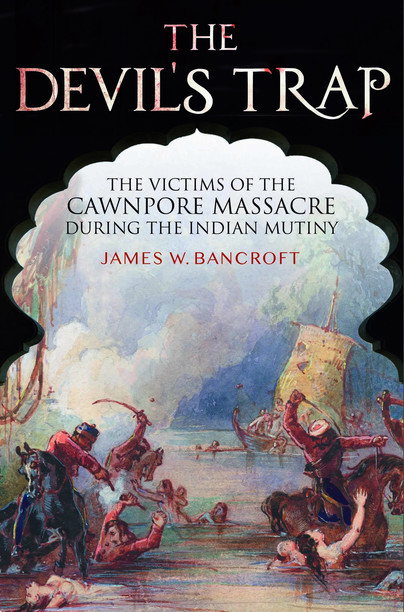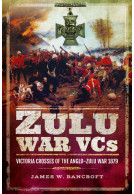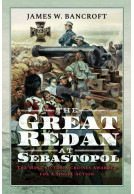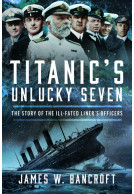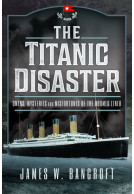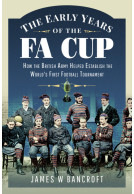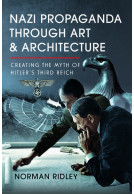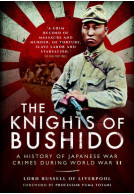The Devil's Trap (Hardback)
The Victims of the Cawnpore Massacre During the Indian Mutiny
Star review
As reviewed in History of War magazine, issue 76: 'The heart-breaking true story of the most brutal episode of the Indian Mutiny told through the lives of its victims.'
(click here for international delivery rates)
Need a currency converter? Check XE.com for live rates
| Other formats available - Buy the Hardback and get the eBook for free! | Price |
|---|---|
| The Devil's Trap ePub (13.0 MB) Add to Basket | £6.99 |
The Indian Rebellion of 1857-58 was the most ferocious explosion of violence in the history of the British Empire. It tested Britain’s colonial resources to the limit, and nearly brought about the downfall of its rule in India.
As the rebellion spread the strategic garrison at Cawnpore came under siege from rebels. The British inhabitants, including many non-combatant males and women and children, were caught up in the terrible events and spent nearly two months under profound threat which put them in fear for their lives and the likelihood of a brutal death; but they could not have imagined how dreadful that death would be. They suffered from thirst and starvation, and heat-stroke from the relentless scorching sun, holed up in a makeshift entrenchment, riddled with disease caused by the lack of sanitary provisions, and their numbers being seriously depleted from continuous bombardment by cannon balls and bullets from rebel snipers.
On being promised safe passage out of the city by boats, most of the men were treacherously massacred at the Sati Chaura Ghat, a landing-stage on the banks of the River Ganges, and the surviving women and children were imprisoned in a house known as the Bibighar to await their fate. That came on 15 July 1857, when they were slaughtered with cleavers in a murderous frenzy. On the following morning their naked remains were unceremoniously thrown down a well. At least six of them were still clinging on to life, including three children.
Much has been written about the siege of Cawnpore and the political events which caused it, but there less known about the people who suffered the ordeal. Who were they, and where did they come from? James Bancroft is well-known for the depth of research he carries out, and during this project he has followed the lives of many of the victims. For instance, one had worked with the engineer Brunel; a member of a family of one of the victims later became a well-known cricketer and footballer, and another was a descendant of an Anglo-Norman West Country family.
The author has tried to redress this by consulting official documentation and establishments, studying primary sources and contacting descendants, then cross-referencing and checking the information as much as possible. To try to understand opinions on both sides, he also studied documents and contacted individuals who believe the events at Cawnpore were India’s first steps in the freedom struggle towards eventual independence, and they have no misgivings concerning what happened.
On a visit to the Sati Chaura Ghat, Sir Frederick Treves, the prominent Victorian surgeon who witnessed the hurtful sufferings of the Elephant Man, referred to is as: ‘This Devil’s Trap!’
Wow this book had me from the start because I never know anything about this part of our history, as well as making me feel like I wanted to cry, while it's heartbreaking, it's a tale that needs to be told, so we can never forget what happened.
NetGalley, Elizabeth Means
Review by Andrew Smith
Journal of the Victorian Military Society
The Devil’s Trap is well-researched, superbly written and offers a compelling story, reminding us of the true horror of Cawnpore. Highly recommended.
The resulting story still strikes today for its dramatic and bloody implications, with the Sepoys (Indian rebel soldiers) who committed crimes (which were later punished in an exemplary way by the British) incomprehensible and perhaps dictated by an almost mystical conviction that the 1857 was the year of the end of the Raj (100 years after Clive's victory at Plassey). The book "The Devil's Trap" is a great addition to any library that talks about the Raj, although obviously those who want a complete narration of the events that led the Sepoys to rebel should look elsewhere, given the specificity of the volume in question. At the same time it seems that today little remains of those events, certainly in India, where all the mausoleums have been moved or removed and where figures such as Tantia Tope who were instrumental in the massacre are even celebrated. This book tries to remember those who made a long journey, often for love, like the strong women of Cawnpore, to die horribly. Their sacrifice must be remembered.
On The Old Barbed Wire
Read the full Italian review here
James W. Bancroft's book adds more detail and understanding to the horrible events at Cawnpore in 1857. It is no wonder that Victorian Britain regarded those who were killed there, especially the women and children, as being nothing short of martyrs to Empire. I am a firm believer that every life is inherently fascinating and the lives of these victims and the few survivors are similarly interesting. I believe the author does them a service in turning them into identifiable human beings and setting out where they were born, where they grew up, who they married, who their parents were and how they ended up in Cawnpore at that fateful time. They may have lived and died over 160 years ago but their lives can still feel remarkably relatable; they loved their families, got sick, married, had jobs to do even if in an exotic and often inhospitable location. This book adds additional insight into the lives of those involved in what must surely be one of the saddest incidents in imperial history. It must be hard to add new information on an infamous event that took place over 160 years ago, but the author has managed to do precisely this. Therefore, this book is to be commended as a welcome addition to the Cawnpore corpus.
The British Empire
Read the full review here
llustrated by a section of images in color or black and white, this hardcover book is a gripping portrayal of personal stories underlying historic events.
Toy Soldier & Model Figure Magazine, issue 248
You could tell that the author did a lot of research and it shows in how well the book is done. It was great to learn about something that I had never heard of.
NetGalley, Kay McLeer
A vivid account of an insurrection that shook the British Empire. The photo-plate sections add to the text with some very interesting images, many in full colour. – Highly Recommended.
Firetrench
Read the full review here
'History of War recommends...'
All About History
The horrific massacre of the British garrison at Gawnpore during the Indian mutiny is the subject of James Bancroft's new book, with amazing tales of survival in the face of the most dreadful treatment of the incarcerated men, women and children. A real life horror story, expertly researched and told by James.
Books Monthly
Bancroft has produced a meticulously researched and well-written account that brings to the reader the true heart-breaking human tragedy of the Cawnpore massacre in a way not previously achieved. The brutality of the subject matter sometimes makes it a difficult read but for anyone wishing to understand the true, dark nature of the Indian Mutiny it is a must-read.
History of War, issue 76
Author article: 'Teenager cornered then killed in The Devil’s Trap' as featured by
Lancashire Evening Post, 4th December 2019
It is, I think, a very well-researched account of the Cawnpore Massacre, and well worth reading if you are interested in it and/or the British Empire history of this area.
NetGalley, Janette Forman
Article: 'The Dorset woman who escaped being killed in a murderous frenzy - but succumbed to smallpox' as featured by
Dorset Echo, 19th November 2019 – words by Joanna Davis
Article: 'New book tells the story of Yorkshire heroine's role in tragic massacre in India' as featured by
The Yorkshire Post – words by Grace Newton
An interesting look at almost moment to moment of what happened in India. Listing of the names of victims and those involved. A good source of primary information and not overwhelming in boring text. Easy to read.
NetGalley, Alexandra Roth
The Devil’s Trap is exceedingly well written, researched, and is easy to follow for those previously unfamiliar with these ground breaking historic events. The Massacre was as shaking to the British Empire as 9/11 was to the USA. It was devastating in terms of the loss of human life, and changed forever the relationship previously enjoyed by the protagonists. Despite the loss of life, the British Raj continued beyond 1858 until 1947 pretty much without radical change.
NetGalley, Nemo Nemo
About James W Bancroft
JAMES BANCROFT has produced more than 100 books and articles, the subjects of which reflect his varied interests. He has contributed a number of articles for The New Oxford Dictionary of National Biography, and his book Rorke’s Drift: The Zulu War, 1879 has been re-printed seven times. His JWB Historical Library, compiled over four decades, is one of the largest private collections of its kind in the world. When he is not writing, James enjoys singing and playing and listening to music, and being with his growing family.







